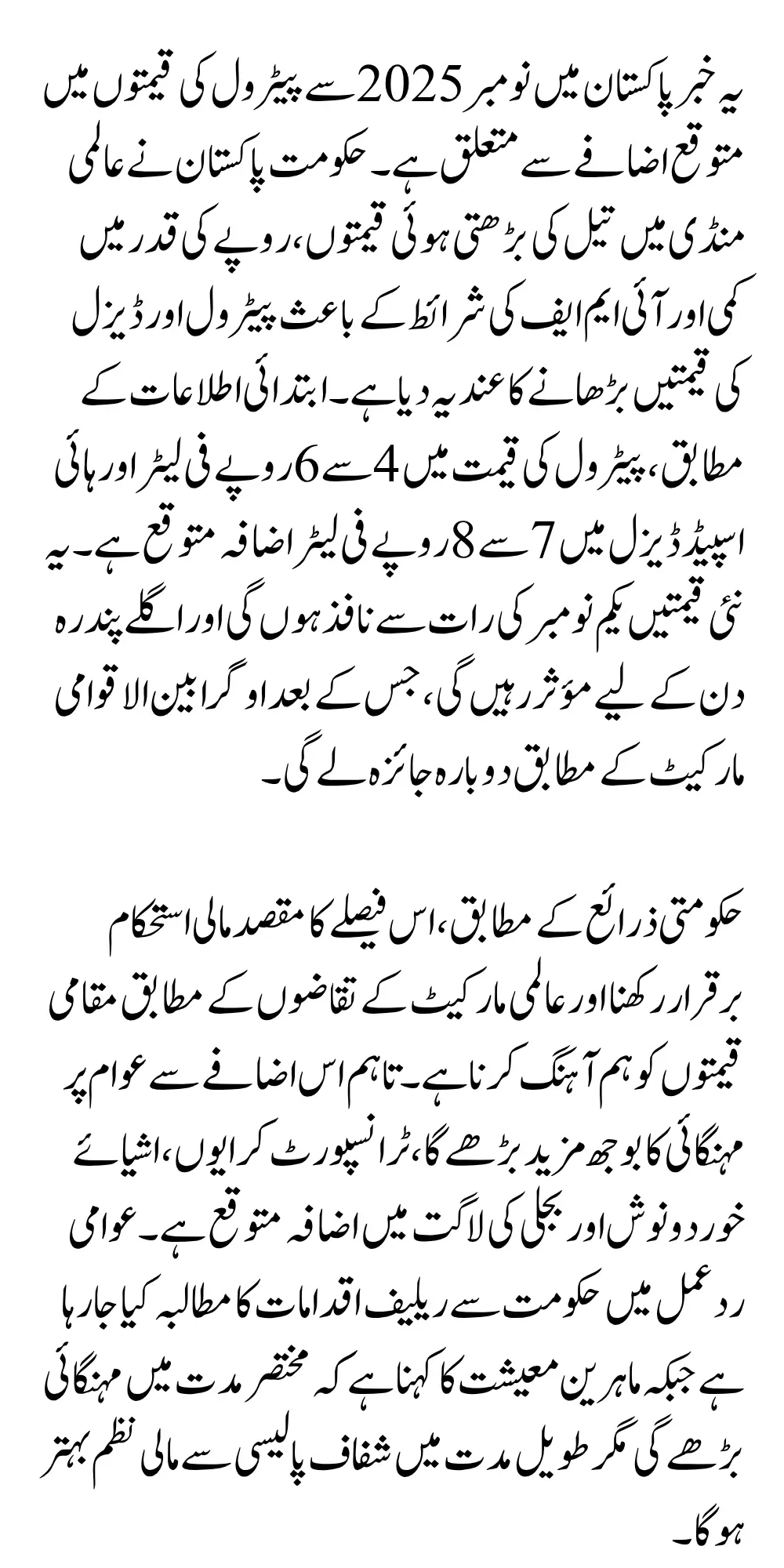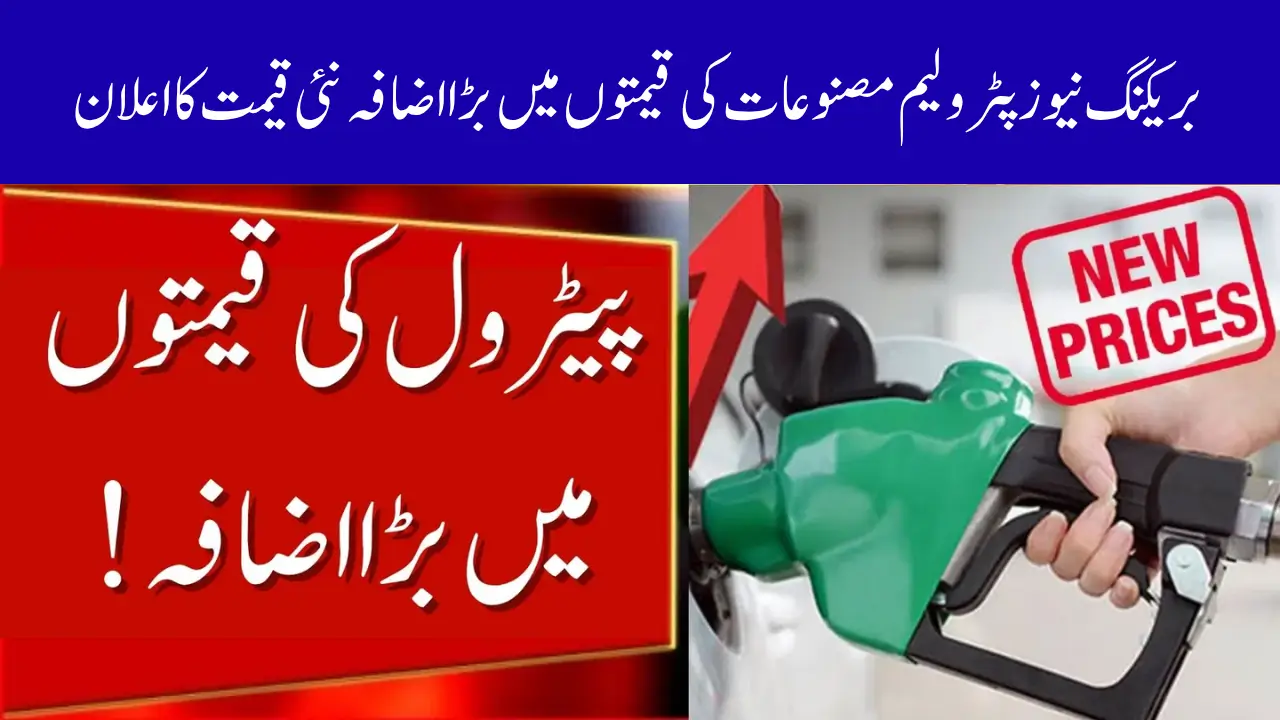Petrol Prices in Pakistan
Petrol Prices in Pakistan: In a new development, the Government of Pakistan has announced a possible increase in petrol prices from November 1, 2025 the decision, expected to be officially confirmed by the Ministry of Finance, follows global market fluctuations and internal fiscal challenges. This change will have a direct effect on the daily lives of millions of Pakistanis who are already facing inflation and rising living costs.

According to initial reports, the increase in petrol and diesel prices is likely to take effect after midnight on November 1. The government is finalizing the summary and will submit it to the Prime Minister for approval. As per the proposed plan, petrol prices are expected to rise by Rs. 4 to Rs. 6 per litre, while high-speed diesel could go up by Rs. 7 to Rs. 8 per litre. These new rates will remain in place for the first half of November before being reviewed again by OGRA.
You Can Also Read: Easypaisa Digital Bank Profit Growth Reports Record in 2025
| Date of Revision | November 1, 2025 |
|---|---|
| Petrol Price Increase | Rs. 4 – Rs. 6 per litre |
| Diesel Price Increase | Rs. 7 – Rs. 8 per litre |
| Reason for Hike | Global oil price surge, rupee depreciation, and IMF policy adjustment |
| Authority Responsible | Finance Ministry & OGRA |
| Next Price Review | Mid-November 2025 |
| Expected Impact | Increased transport fares, inflation, and higher cost of goods |
Govt to Increase Petrol Prices in Pakistan from November 1
The Government of Pakistan has reviewed the existing fuel pricing mechanism in coordination with the Oil and Gas Regulatory Authority (OGRA). Officials state that the adjustment aims to align domestic prices with the latest international crude oil rates. The review process was conducted after analyzing the global market trends and exchange rate shifts that directly influence import costs.
This step is part of a broader fiscal approach to stabilize national revenue while ensuring that subsidies do not negatively affect the country’s budget. However, the expected rise in petroleum prices will increase transportation, industrial, and household expenses, impacting the general public more severely.
Reasons Behind the Petrol Price Increase in Pakistan
The government’s decision to revise petrol prices stems from several economic and international factors. The continuous surge in global oil prices, coupled with the depreciation of the Pakistani rupee, has raised the overall import cost. Moreover, compliance with International Monetary Fund (IMF) guidelines requires Pakistan to maintain a realistic fuel pricing policy that reflects true market dynamics.
This adjustment is also linked to the government’s commitment to improve fiscal discipline. By revising petroleum levies, the state can generate additional revenue to meet financial targets and reduce dependence on external borrowing. This move, however, also means that consumers will experience higher fuel costs in the short term.
Rising Global Oil Prices Affecting Local Market
The international oil market has seen a consistent upward trend over the past few months. This has been driven by supply cuts from leading oil-producing nations and growing global demand. As Pakistan imports a significant portion of its fuel, any increase in international crude prices directly affects the local retail prices of petrol and diesel.
This dependency exposes Pakistan’s economy to external market fluctuations. Whenever global prices surge, the country’s import bill rises, leading to inflationary pressure and further economic strain on ordinary citizens.
You Can Also Read: SJP Sindh Job Portal Login & Registration Process 2025
Depreciation of Pakistani Rupee and Its Impact on Fuel Prices
Another key factor behind the increase in fuel prices is the depreciation of the Pakistani rupee against the US dollar. Since petroleum imports are priced in dollars, any decline in the rupee’s value automatically raises the cost of imported oil. This puts additional pressure on domestic fuel pricing and reduces the government’s ability to maintain previous price levels.
The weakening currency also contributes to rising inflation in other sectors, making basic goods and services more expensive. The government faces a challenging situation as it tries to balance economic stability with public affordability.
IMF Conditions and Petroleum Levy Adjustments
Under Pakistan’s ongoing agreement with the International Monetary Fund, the government must maintain transparency in petroleum pricing. The IMF requires adjustments that prevent subsidies from distorting market prices. This ensures that the true cost of oil is reflected in consumer prices.
Additionally, the petroleum levy serves as a major source of non-tax revenue for the government. To meet fiscal goals, adjustments in this levy are expected, which will increase the final retail price of fuel. While this helps improve revenue collection, it places additional financial stress on consumers.
Expected Petrol and Diesel Prices in November 2025
As per early estimates, petrol prices are expected to increase by Rs. 4 to Rs. 6 per litre, while high-speed diesel could rise by Rs. 7 to Rs. 8 per litre. These revised rates will apply from November 1 for a period of fifteen days. After that, OGRA will conduct another review based on global oil market conditions.
The government has assured that if international oil prices decline in the future, the benefit will be passed on to local consumers through price reductions. This system follows a transparent, market-based pricing model designed to reflect real-time cost variations.
Impact on Daily Life and Economy
The rise in fuel prices will have a broad impact on several aspects of the economy. Transportation costs are expected to rise, leading to an increase in public transport fares. The industrial sector will face higher operating expenses due to costlier logistics and raw materials.
For households, the increase in petrol and diesel prices will raise the overall cost of living. Consumers may experience higher food prices, inflated utility costs, and a general strain on family budgets. These effects could also contribute to slower economic growth and reduced consumer spending.
You Can Also Read: BISP Payment Discreet 2025 New Eligibility Status Verification Rules
Key Effects of Petrol Price Hike on Daily Life
- Transport fares likely to increase due to rising fuel costs
- Higher logistics costs for goods transportation and supply chains
- Impact on agricultural machinery and industrial operations
- Increase in prices of essential goods and household items
- Reduced purchasing power and higher inflation pressure
Government’s Official Statement and Implementation Timeline
According to a senior official from the Ministry of Finance, the final proposal for new petroleum prices is being prepared for submission to the Prime Minister. Once approved, the new rates will take effect from midnight, November 1. The government aims to keep the process transparent, allowing future reductions if international rates drop.
This system ensures that petrol and diesel prices remain linked to global market conditions, reducing the chance of artificial distortions. The government has stated that it will continue to review and adjust prices in a consistent manner.
Public Reaction and Social Media Response
The announcement has sparked wide public debate across social media and news outlets. Many citizens have expressed frustration over the frequent price hikes, urging the government to implement relief packages to offset inflation. Traders and transporters have warned that the price increase will raise operational costs and consumer prices.
Despite the criticism, officials argue that the adjustment is necessary to stabilize the economy and maintain fiscal balance. They emphasize that without these steps, the country would face further economic instability and external debt challenges.
Public Concerns and Social Reactions
- Citizens express concern about growing inflation and living costs
- Transport unions warn of fare increases and business disruptions
- Traders highlight rising logistics expenses and reduced sales
- Economists call for balanced fiscal management and price control policies
Market Analysis and Expert Opinions
Economic analysts suggest that while the increase in petrol prices may seem harsh, it reflects the reality of Pakistan’s dependency on imported oil. Experts believe that maintaining market-linked fuel pricing is essential to prevent budgetary imbalances. However, they also stress the need for the government to provide targeted subsidies to low-income households.
In the long term, shifting toward alternative energy sources could reduce Pakistan’s vulnerability to global oil price changes. Encouraging electric vehicles and renewable energy projects may help minimize future inflationary shocks.
You Can Also Read: Sindh Job Portal Government Jobs Online Registration 2025
Government’s Commitment to Transparency
The government has reiterated its pledge to maintain transparency in fuel pricing and to pass on any future international relief to consumers. Officials emphasize that all adjustments are made following OGRA’s recommendations, ensuring fair implementation.
They also confirmed that petroleum price changes are now part of a data-driven system that monitors global oil trends, exchange rates, and domestic demand to determine the fairest possible rates.
Comparison with Previous Petrol Price Revisions
Looking at 2025, this increase marks one of several revisions made throughout the year. Earlier adjustments in April and July also reflected changes in global oil prices. The frequency of these revisions highlights the volatility of the international market and its direct impact on Pakistan’s economy.
This trend has also prompted the government to adopt bi-monthly pricing reviews, allowing for quicker responses to market changes and reducing large one-time increases.
Frequently Asked Questions about Petrol Prices in Pakistan
- Why is the government increasing petrol prices in November 2025?
- How much are petrol and diesel prices expected to rise?
- Who decides the final fuel prices in Pakistan?
- When will the new prices take effect?
- Will petrol prices decrease if global rates drop in the future?
Conclusion
The upcoming petrol price adjustment from November 1, 2025, reflects the government’s effort to align domestic fuel rates with global market realities. Although this move may increase short-term inflation, it is designed to strengthen Pakistan’s fiscal stability and ensure transparency in pricing mechanisms.
Citizens are advised to follow official Ministry of Finance announcements to confirm the final rates. As the global oil market stabilizes, there is hope that future reductions will bring much-needed relief to the public while maintaining economic balance.
You Can Also Read: BISP New Payment 2025 Update 3 Key Changes
